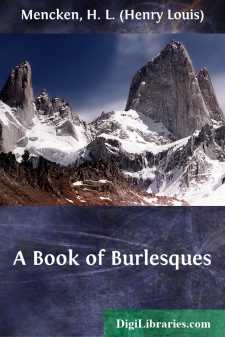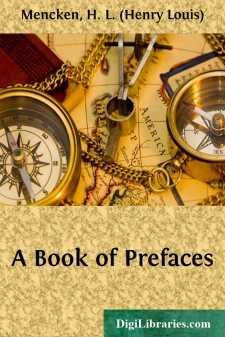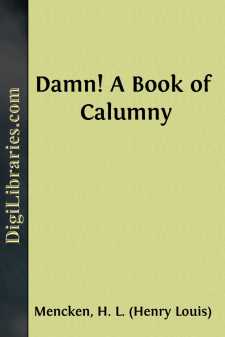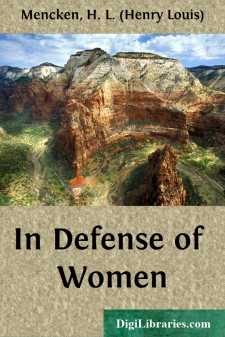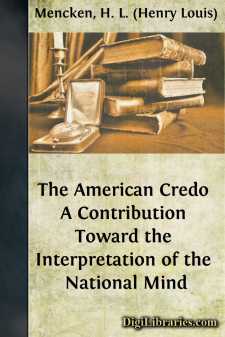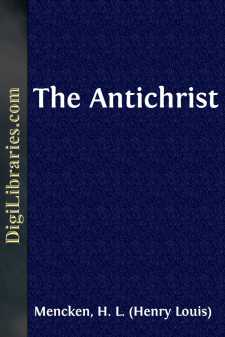Categories
- Antiques & Collectibles 13
- Architecture 36
- Art 48
- Bibles 22
- Biography & Autobiography 813
- Body, Mind & Spirit 142
- Business & Economics 28
- Children's Books 17
- Children's Fiction 14
- Computers 4
- Cooking 94
- Crafts & Hobbies 4
- Drama 346
- Education 46
- Family & Relationships 57
- Fiction 11829
- Games 19
- Gardening 17
- Health & Fitness 34
- History 1377
- House & Home 1
- Humor 147
- Juvenile Fiction 1873
- Juvenile Nonfiction 202
- Language Arts & Disciplines 88
- Law 16
- Literary Collections 686
- Literary Criticism 179
- Mathematics 13
- Medical 41
- Music 40
- Nature 179
- Non-Classifiable 1768
- Performing Arts 7
- Periodicals 1453
- Philosophy 64
- Photography 2
- Poetry 896
- Political Science 203
- Psychology 42
- Reference 154
- Religion 513
- Science 126
- Self-Help 84
- Social Science 81
- Sports & Recreation 34
- Study Aids 3
- Technology & Engineering 59
- Transportation 23
- Travel 463
- True Crime 29
H. L. (Henry Louis) Mencken
Henry Louis Mencken (1880-1956) was an influential American journalist, essayist, satirist, cultural critic, and scholar of American English. He is best known for his work "The American Language," a multi-volume study of how the English language is spoken in the United States, and for his scathing critiques of American life and politics in his articles for the Baltimore Sun. Mencken's wit and sharp commentary made him a prominent figure in the 1920s and 1930s, earning him the nickname "the Sage of Baltimore."
Author's Books:
Sort by:
I.—DEATH I.—Death. A Philosophical Discussion The back parlor of any average American home. The blinds are drawn and a single gas-jet burns feebly. A dim suggestion of festivity: strange chairs, the table pushed back, a decanter and glasses. A heavy, suffocating, discordant scent of flowers—roses, carnations, lilies, gardenias. A general stuffiness and mugginess, as if it were raining outside,...
more...
JOSEPH CONRAD "Under all his stories there ebbs and flows a kind of tempered melancholy, a sense of seeking and not finding...." I take the words from a little book on Joseph Conrad by Wilson Follett, privately printed, and now, I believe, out of print. They define both the mood of the stories as works of art and their burden and direction as criticisms of life. Like Dreiser, Conrad is forever...
more...
PATER PATRIÆ If George Washington were alive today, what a shining mark he would be for the whole camorra of uplifters, forward-lookers and professional patriots! He was the Rockefeller of his time, the richest man in the United States, a promoter of stock companies, a land-grabber, an exploiter of mines and timber. He was a bitter opponent of foreign alliances, and denounced their evils in harsh,...
more...
1. The Maternal Instinct A man's women folk, whatever their outward show of respect for his merit and authority, always regard him secretly as an ass, and with something akin to pity. His most gaudy sayings and doings seldom deceive them; they see the actual man within, and know him for a shallow and pathetic fellow. In this fact, perhaps, lies one of the best proofs of feminine intelligence, or,...
more...
PREFACE I The superficial, no doubt, will mistake this little book for a somewhat laborious attempt at jocosity. Because, incidentally to its main purpose, it unveils occasional ideas of so inordinate an erroneousness that they verge upon the ludicrous, it will be set down a piece of spoofing, and perhaps denounced as in bad taste. But all the while that main purpose will remain clear enough to the...
more...
INTRODUCTION Save for his raucous, rhapsodical autobiography, “Ecce Homo,” “The Antichrist” is the last thing that Nietzsche ever wrote, and so it may be accepted as a statement of some of his most salient ideas in their final form. Notes for it had been accumulating for years and it was to have constituted the first volume of his long-projected magnum opus, “The Will to Power.” His full...
more...


